Warhammer 40,000 is a tabletop game of dark, futuristic warfare that sees carnage erupt on a spectacular scale.
It is set in the distant future, where a stagnant human civilization is beset by hostile aliens and supernatural creatures. The models in the game are a mixture of humans, aliens, and supernatural monsters, wielding futuristic weaponry and supernatural powers.
In this article, Gurugamer is going to showcase the top 5 best Warhammer games to play in 2022.
1. Warhammer 40,000: Dawn of War
Dawn of War is a fantastic modern RTS that measures up very well against the greats in the genre like Starcraft and Age of Empires. It takes place in the Warhammer 40k universe but manages to appeal to players who aren't familiar with the tabletop or lore such as myself.
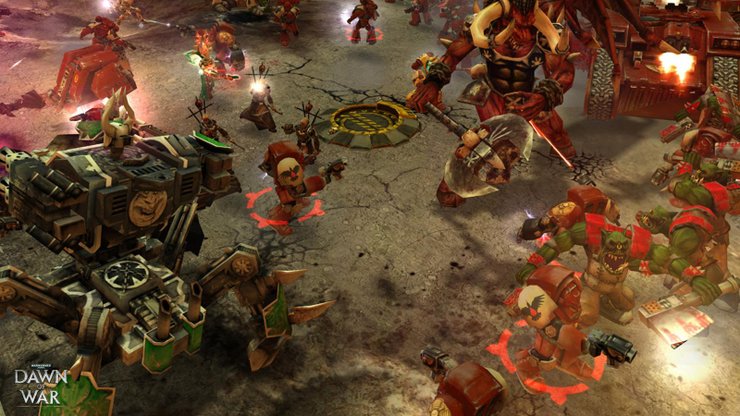
Dawn of War unlike most "older" RTS games isn't focused on building or resource gathering. You gain resources automatically by capturing "strategic points" around the map and stealing them from other players. This encourages exploring the map and assaulting other players very quickly early on. The building is also done very early on so the majority of what you spend your time on is creating units and attacking players.
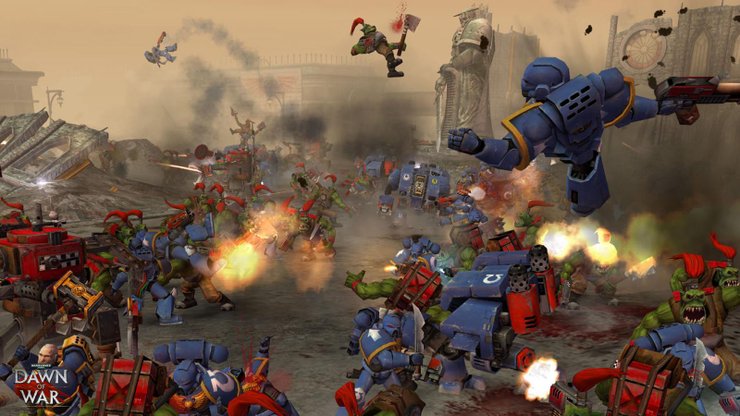
Combat in Dawn of War is done very well. Because there's very little micromanagement with resources and buildings you spend most of the game creating squads, upgrading those squads with different weapons, and assaulting the enemy. Each of the 4 races is familiar but different enough that you'll quickly pick out a favorite among them. Dawn of War's greatest asset is speed, games go by very quickly and you are always getting rewarded for the smallest of accomplishments like capturing strategic points. Which stack up greatly as the game goes on. There are also a lot of little details to the game like how Space Marine buildings are generated by being dropped from orbit.
2. Warhammer 40,000: Battlesector
Warhammer 40,000: Battlesector is a really solid and enjoyable game where the combat feels good and the 40k vibe feels near enough just right.

Its primary feature is a 20-mission narrative campaign that ties together a set of battles where you choose which forces to bring from those gradually unlocked. Most people are going to get 25+ hours out of the campaign although someone desperate to speed run it could certainly halve that. New units, weapon loadouts, and buffs for units are unlocked from mission to mission so you can focus on playing just with some units or develop a broader build for your force for each mission. There are ample difficulty settings to shift things from a roflstomp across the maps to attritional battles depending on your own preference. It's 20 narrative battles linked by the story and a handful of HQ heroes rather than an XCom-like ongoing campaign of individual unit progression.
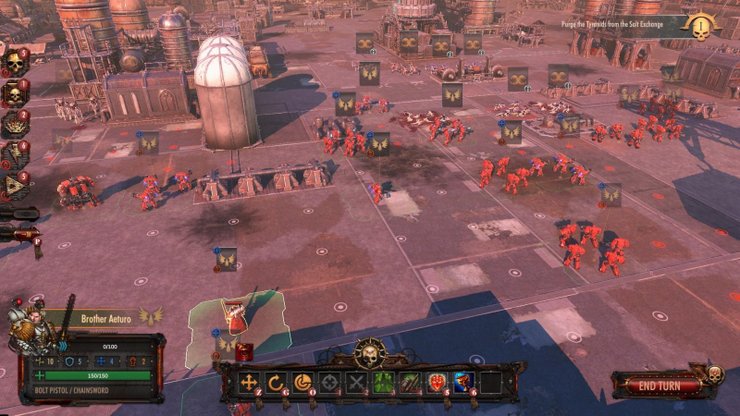
The mechanics and unit types tend to encourage you to play aggressively but if you want to hunker down and corner camp with overwatch then that too is occasionally a viable option. The combat reminds me a fair bit of how Byzantine Games handle historical warfare - you don't need to know the detail at lower difficulty levels to have a good time but it's there to unpick on higher difficulty levels and knowing when you'll get a reaction shot and when you won't nearly always have a payoff.
3. Warhammer 40,000: Space Marine
This is Warhammer 40k, but it's not. Instead, this is a third-person hack and slash, with ranged weapons where you play a Space Marine (or an Ultramarine) and fight through 18 stages. It is in the 40k universe, but it doesn't require the massive wealth of knowledge or fandom most of these games seem to expect.
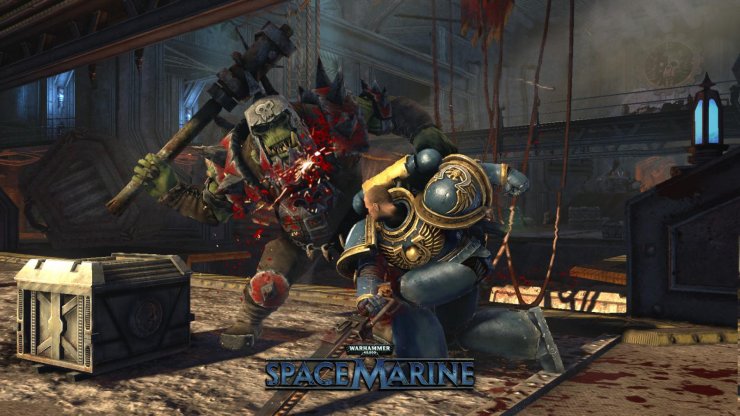
And you know what? It's the first Warhammer 40k game I really really enjoyed. Dawn of War is a fine RTS if you really want to play an RTS, or really want to deal with that complexity, however, Space Marine brings the user into the universe and creates a reasonable scope of the world for them to enjoy.
It avoids overly repetitive gameplay, it avoids the massively complex world of 40k which will overwhelm all but a few fans of sci-fi with the ability to comprehend it all from a game and focuses on just a single adventure in that universe.
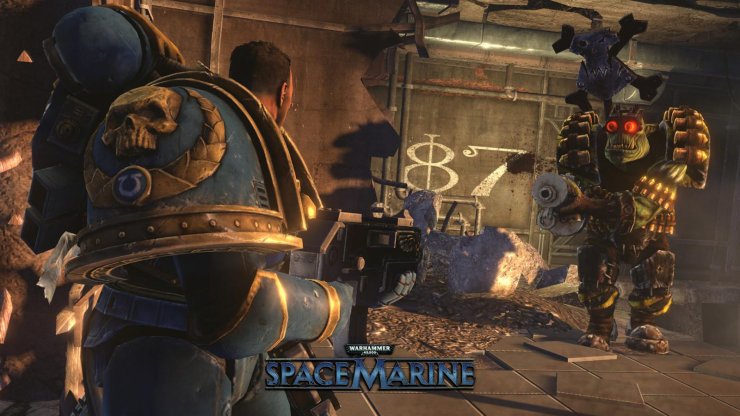
And it works! The gameplay is fantastic, and the main character has a decent amount of options. You can choose from three weapons, and a number of ranged weapons (carrying up to 4 at a time, with I believe at least 7 different weapons, not counting full upgrades). The enemies are a little similar, for a majority of the game you will fight the orks (one of the six races) but there's enough variety in location, ability and configurations that it rarely feels like a slog, surprisingly so.
4. Warhammer 40,000: Mechanicus
Mechanicus is a turn-based tactics game set in the Warhammer 40K universe. The player controls the Adeptus Mechanicus, a faction whose members have replaced their body parts with technology and are now more machine than Human, in combat against the robotic skeletons known as Necrons.
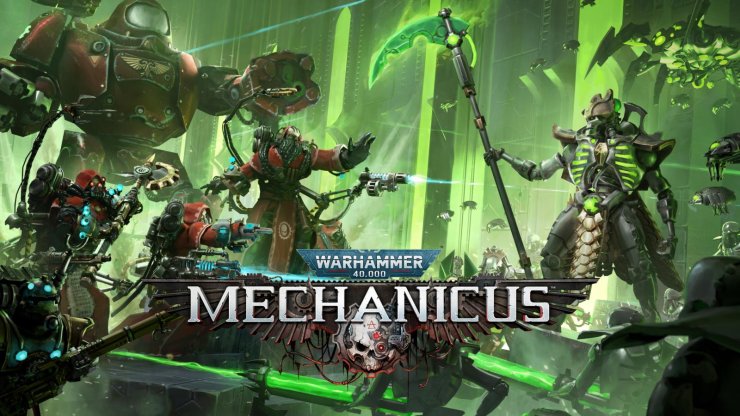
At the start of the campaign, you'll be able to field a squad of six units, including two Tech Priests (your main characters who can level up, equip powerful weapons and use special class abilities) and four Troops (basic units who you can't customize). Completing certain missions will unlock more Tech-Priests, better types of Troops, and increase your squad size.
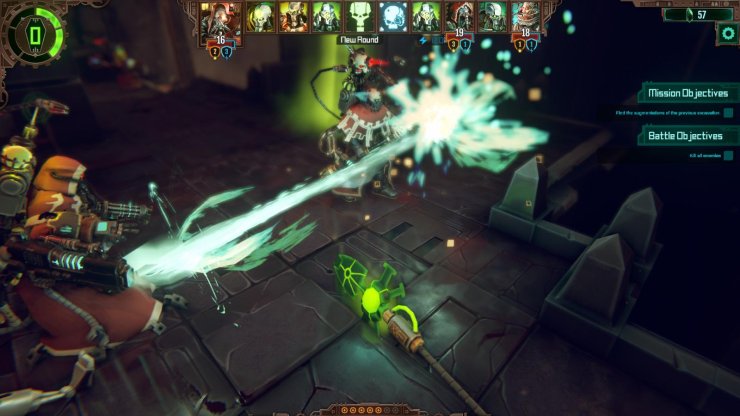
Mechanicus has an unusual economy system during battles, where almost every action your Tech-Priests can take (attacking, using skills, summoning Troops, extra movement) costs "Cognition Points". If you don't have any CP, your Tech-Priests can't do anything, although Troops can attack for free (if you’ve already summoned them). Tech-Priests can equip melee and ranged weapons. Each weapon deals either physical or electrical damage and most enemies have armor that reduces one type of damage, so you need to attack them with weapons they're weak against. Some weapons like the flamethrower and phosphor blaster can hit multiple enemies (and friendlies) in a cone-shaped area.
5. Warhammer 40,000: Dawn of War II
Dawn of War II is a science-fiction real-time strategy game based in the Warhammer 40k universe.
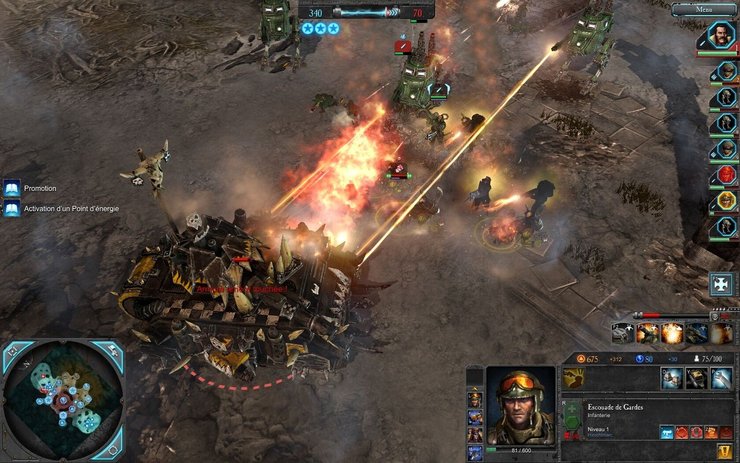
When most people think of RTS games, games such as Starcraft and Warcraft typically come to mind. You have workers to build up your base so that you can train more powerful soldiers. Resources must be harvested, but there is a finite amount of them. Indeed, this is how the first Dawn of War functioned. However, the sequel takes a much different approach.
In the single-player campaign, you are given 6 unique squads, and 6 only, to take on missions. No base building whatsoever. These squads can be upgraded with weapons and armor and can level up to gain bonus abilities. It is an extremely well-executed combination of an RPG and an RTS. The story is fairly linear, but you are free to explore the planets and do side missions at your relative leisure (that is, until the space bugs show up. Then you need to be quick, or else the bugs will eat the planet).

The multiplayer is also a genre-masher. Each race has three different "heroes" who act similarly to champions in DotA or LoL. They level up, can be upgraded, and can oftentimes turn the tide of a battle. All of your other units are spawned from your one and only building, so if it dies you're out of luck. There aren't any workers, and you must collect resources by capping points. A capped point will grant you the resource constantly. The more points you have, the more resources you'll consistently obtain.
>>> Read more: Top 5 Best Deck Building Games To Play On PC (2022)
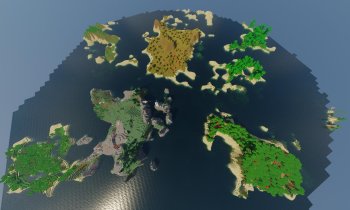
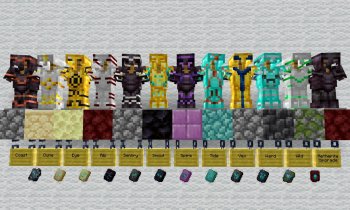








Comments